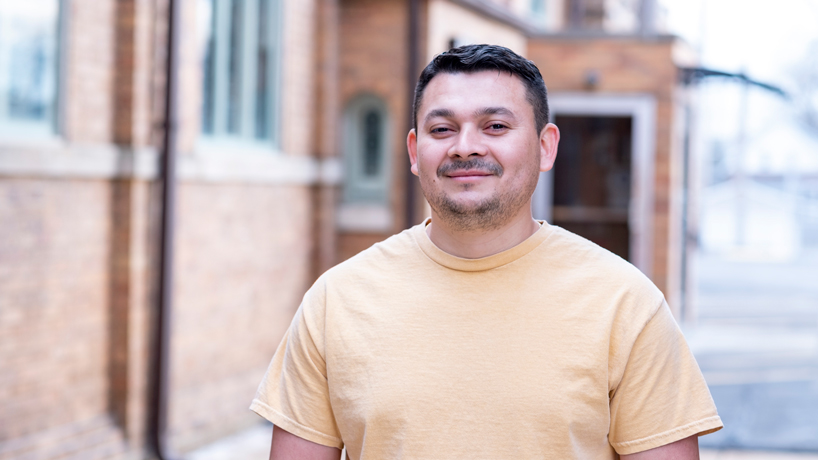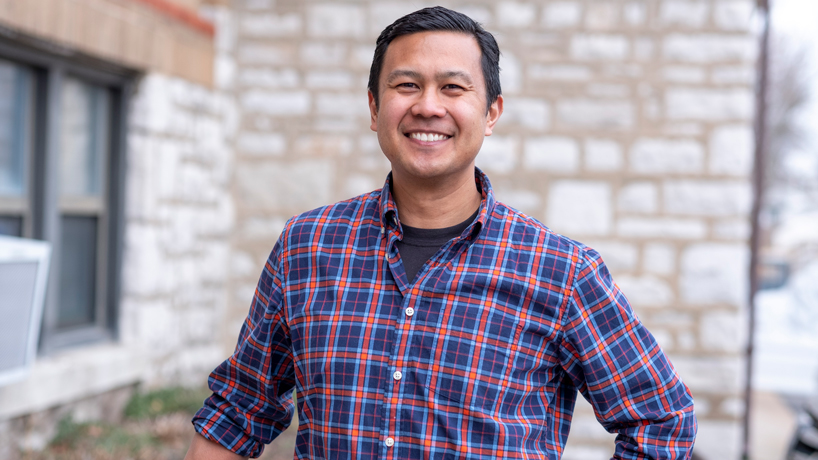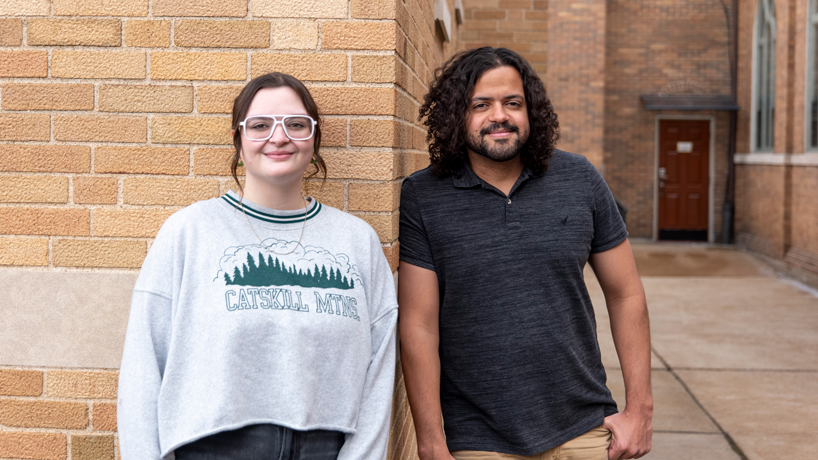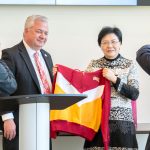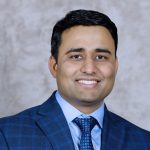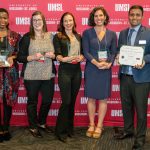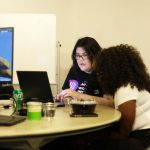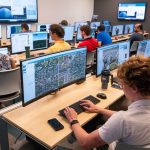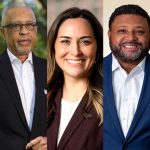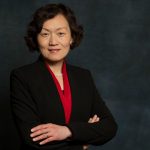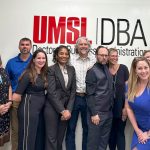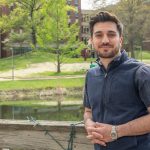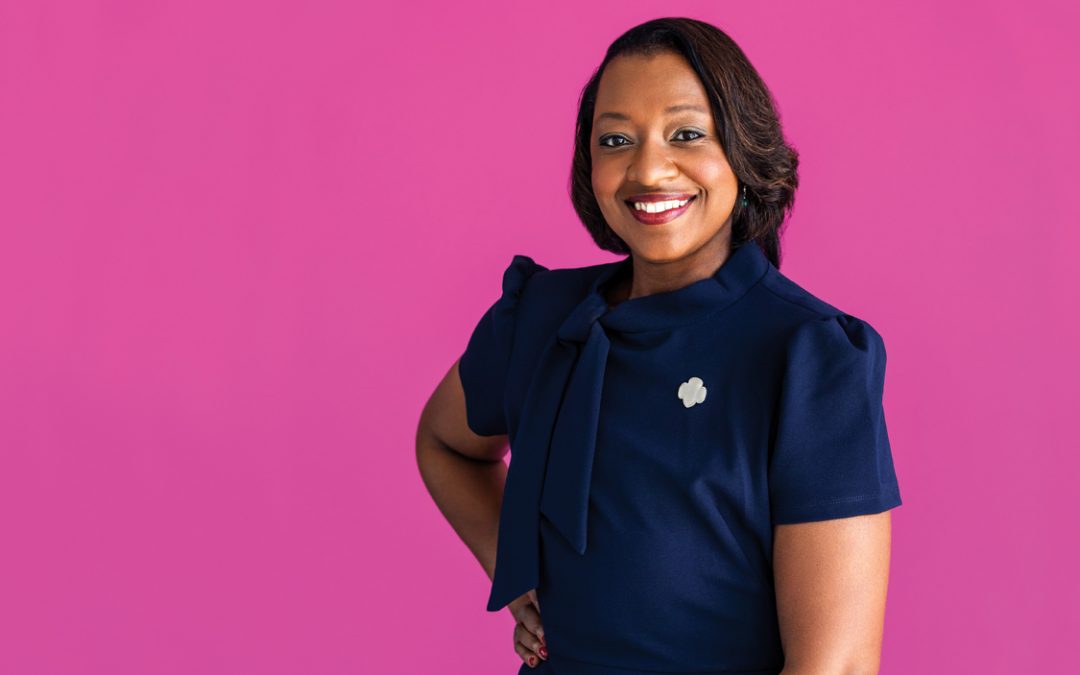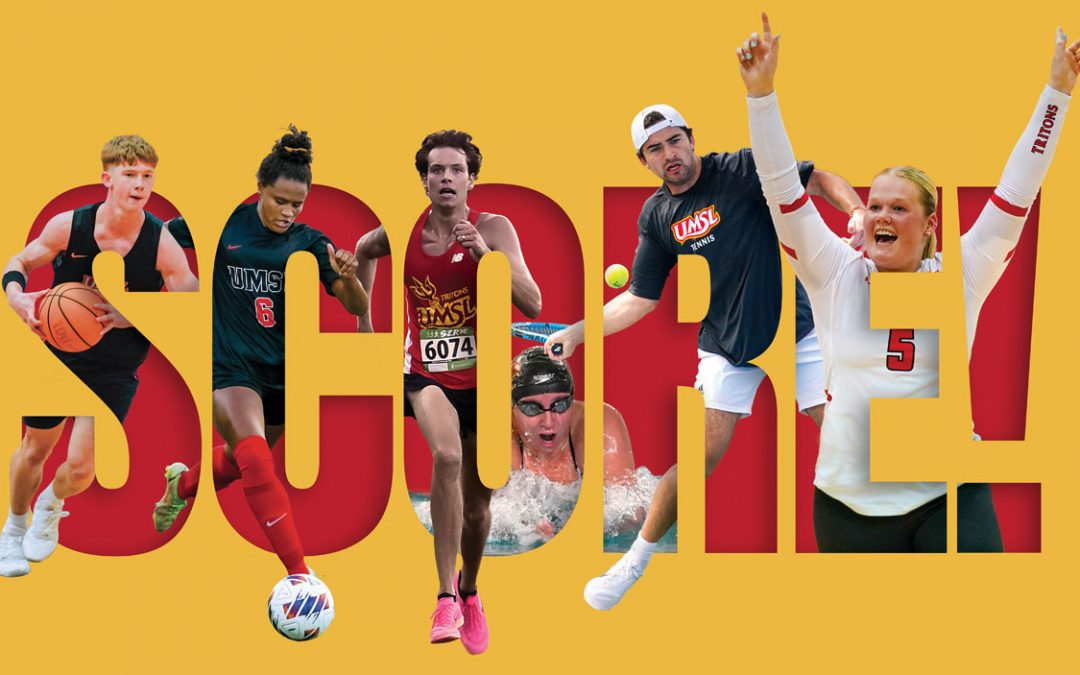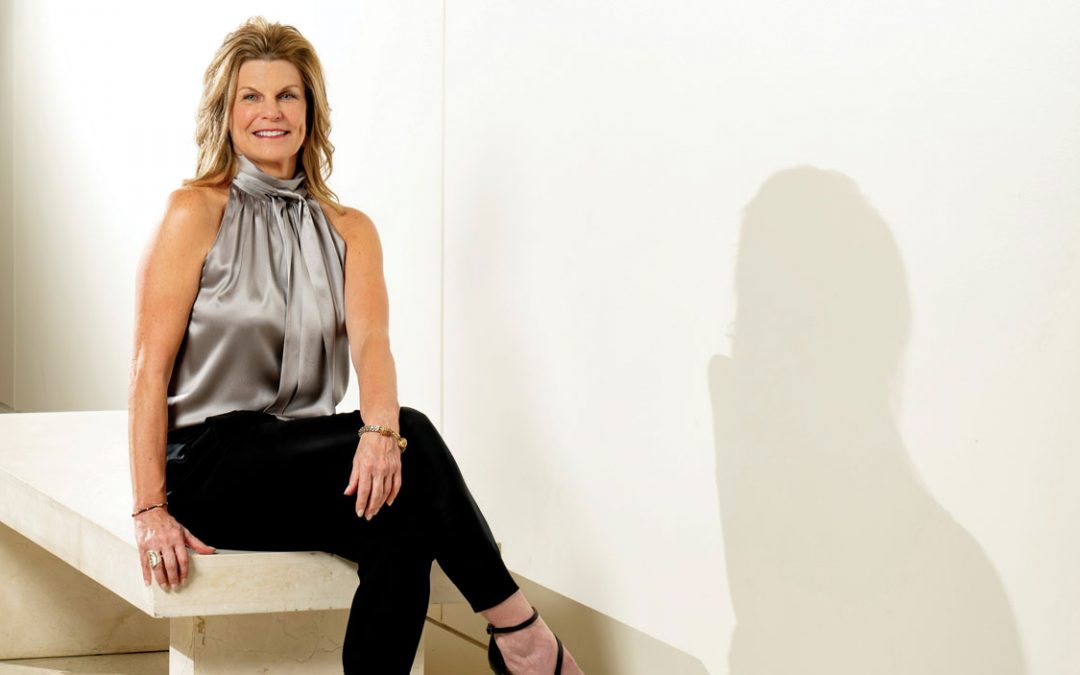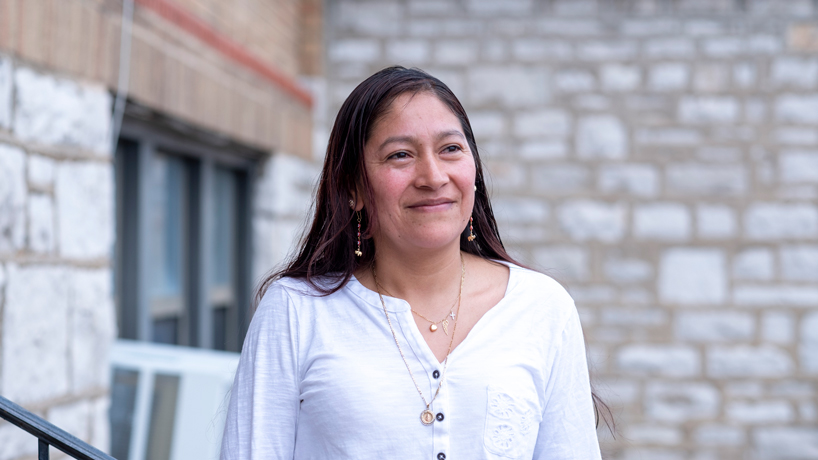
Adelaida Elisabeth Miranda Orozco is one of more than 40 migrants who are part of Migrantes Unidos, a support group created as part of a project led by UMSL Associate Professor Adriano Udani which aims to involve asylum seekers as policy research partners. (Photos by August Jennewein)
Adelaida Elisabeth Miranda Orozco still remembers the stares whenever she’d accompany her two children to the playground near her home in Granite City, Illinois.
She couldn’t escape the eyes of strangers. First, they were fixed on the electronic monitor strapped to her left ankle, and then they’d look at her, their faces betraying suspicion and fear.
The weight of the monitor around her ankle also prevented her from running around with her kids.
“I could not play with my children,” Miranda Orozco says of the yearlong experience of wearing the ankle monitor while speaking through an interpreter. “We would go to the park, and I could not play with them.”
It also cost her jobs. She once landed a position on the housekeeping staff at a local hotel. She’d been there a week when her boss noticed the monitor and promptly fired her. The same thing happened when she was working briefly at an area Chinese restaurant.
Miranda Orozco felt helpless and alone.
Lionel Moreno Rivera, a member of Migantes Unidos, came to the United States seeking asylum with his wife and three children.
It was the promise of safety and stability for her family that brought Miranda Orozco to St. Louis with her children two years ago.
She was one of the thousands of migrants fleeing gang violence, which is only exacerbated by the abject poverty pervasive in the Northern Triangle countries of Guatemala, Honduras and El Salvador in Central America.
Miranda Orozco left Guatemala and journeyed through Mexico to the U.S. border, where she and her children presented themselves to federal agents seeking asylum. They were detained for one night, then traveled to St. Louis while awaiting a court hearing on their case for asylum – a process that usually takes years, not months, because of a backlog in the courts.
After arriving in St. Louis, Miranda Orozco had to visit the Immigration and Customs Enforcement Office and was referred to the office of the Intensive Supervision of Appearance Program – or ISAP – which placed the monitor on her.
Electronic ankle monitors, which track geographical information, have been used by immigration authorities for more than 20 years as an alternative to detention. Their use varies by jurisdiction, but a story published in The Guardian last summer stated that of the 96,574 individuals enrolled in ISAP in May 2021, 31,069 were wearing the monitors. Those individuals were required to be within 70 miles of their homes and typically were not permitted to cross state lines.
Leonel Moreno Rivera followed a similar path as Miranda Orozco when he came to the United States and settled in St. Louis with his wife and three children while seeking asylum from Honduras.
“I never imagined it, especially as a parent,” says Rivera, who was made to wear his ankle monitor for approximately a year and half. “I knew that there was going to be a process, but I thought it was going to be a dignified process. I never imagined that I would be treated as a convict.”
Migrants such as Miranda Orozco and Rivera often feel powerless in a system that seems designed to isolate them, and they have few people advocating on their behalf for more fair and humane treatment.
Associate Professor Adriano Udani worked with colleagues at the Inter-Faith Committee on Latin America and the Migrant and Immigrant Community Action Project to engage migrants as research partners and help them advocate on their own behalf. He received a grant from the Henry Luce Foundation to replicate the project in six other cities.
But Adriano Udani, an associate professor of political science at the University of Missouri–St. Louis and the director of the Public Policy Administration Program, has worked closely with colleagues at two local nonprofits – the Inter-Faith Committee on Latin America and the Migrant and Immigrant Community Action Project – to bring migrants together and engage them as advocates on their own behalf through a support group called Migrantes Unidos.
After first learning of the prevalence of ankle monitors being used to track asylum seekers in St. Louis, Udani began having conversations with Maria Torres Wedding, then the director of client support services at the MICA project, and IFCLA Executive Director Sara John to study the impact the monitors were having on people’s lives. They all wanted to do something new and different than what was provided to asylum seekers in St. Louis.
“This problem could not be simply addressed as an academic researcher,” Udani says. “Previous studies have shown that people who have ankle monitors are not flight risks to leave the country and are not criminals, which undercuts the reasons to have electronic monitoring.”
But the more he talked to Torres Wedding and to John, the more he realized such a project would be insufficient.
“That kind of study wouldn’t be impactful to the asylum seekers,” Udani says. “Until all forms of detention are abolished, they are unable to live their lives completely free of stigma, perpetual surveillance and fear.”
John described a different way.
“Maybe we shouldn’t be the ones trying to figure this out,” she says. “Maybe we need to be engaging the people that have ankle monitors in a much more direct conversation about how we change this.”
In the process, they thought they could build a community for migrants in the St. Louis region to learn from each other and take strength from their shared experiences.
Allie Seleyman and Ángel Flores Fontánez serve as accompaniment coordinators at IFCLA and help organize regular meetings of Migrantes Unidos.
With a $30,000 grant from the University of Missouri System Research and Creative Works Strategic Investment Program and an organizing support grant from the Detention Watch Network, they began a project to involve asylum seekers as policy research partners, creating Migrantes Unidos, which has now grown to more than 40 members.
Allie Seleyman and Ángel Flores Fontánez have helped organize the group as an extension of their work as coordinators of IFCLA’s accompaniment program, which was created in 2017 and arranges for volunteers to accompany migrants to immigration check-ins in a show of solidarity and a source of comfort.
Migrantes Unidos members began meeting monthly, mostly via Zoom, in November 2020. The members are paid $20 an hour for the time they spend participating, though any financial payoffs are of secondary benefit to the camaraderie and knowledge gained from each other.
“Truly, it has benefited me a lot,” Miranda Orozco says. “I am a very shy person, and it helps me to talk and to listen to what other colleagues are saying. I am taking it as a therapy.”
“I value the knowledge and experience that I have gotten from the others,” Rivera says, “and, of course, to be united.”
Typically, their meetings last two hours, and the first hour is open for group members to talk about their experiences.
“Any concern that anybody has, any question, any comment, any celebration – all of that can be shared,” Seleyman says.
The group has discussed how to navigate the process of obtaining passports or filing a change of address or what it’s like going to the immigration court in Kansas City. But the most acute problem most of them have faced was having an ankle monitor.
“When we started meeting, the absolute majority of the group had an ankle monitor still,” Flores Fontánez says. “People at every single meeting were sharing their traumatic experiences – their back aches, their knee aches, their ankle aches – all the problems that were happening. But also, they started sharing, ‘Hey, my ankle monitor was removed when I complained and complained and complained.’”
With those stories, they created a guide others might follow to effectively advocate for their own monitors to be removed. It has proved successful.
Rivera was among the beneficiaries, getting his ankle monitor removed last September after months of trying.
“The day they called me, it was a surprise,” Rivera says. “They told me that they would remove my monitor, and I felt like I was born again.”
Miranda Orozco felt a similar sense of freedom – and plenty of relief – when her monitor was removed in February 2021.
“I felt like they had untied me,” she says. “My hair is not falling out anymore. My health is better now, and I do not feel the stress anymore.”
Udani has been a regular observer at the meetings, collecting qualitative research data, some of which he presented last fall at the American Political Science Association Annual Meeting and Exhibition.
Udani, with support from Torres Wedding and John, also applied for and received a three-year, $250,000 grant from the Henry Luce Foundation in November to develop similar social justice leadership hubs in six other cities in the United States.
Each hub will consist of a group of asylum-seekers working with an academic researcher and organizations prioritizing work on alternatives to detention and providing legal or social services and mutual assistance.
Udani and his colleagues put out a request for proposals in February and have started reviewing applicants. They plan to offer training for the hubs beginning in August.
“Rarely have the people who are impacted by the system become part of those conversations about changing it,” Udani says. “I think the next level for asylum seekers is to be considered as experts, as leaders of work that centers on justice and equity.”
Miranda Orozco, Rivera and so many of the other members of Migrantes Unidos are grateful for the role they’re getting to play in that transformation.
“People have proposed a goal for foreign people like us, and they are giving us support and the trust,” Rivera says. “It is very gratifying to know that, and what we desire most is that others will be able to benefit.”
This story was originally published in the spring 2022 issue of UMSL Magazine. If you have a story idea for UMSL Magazine, email magazine@umsl.edu.

